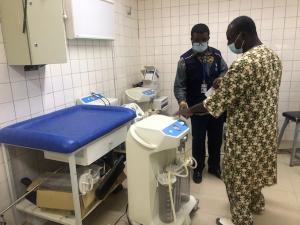Review of maternal deaths and the continuity of essential reproductive, maternal, and child health services in the context of COVID-19 and the Humanitarian Crisis in the Sahel, Burkina Faso
In the context of the double burden of COVID-19 and Humanitarian Emergencies in the Sahel region, analysis of data from the official weekly telegram-letter (TLOH) of the Ministry of Health's showed an unusually high number of institutional maternal deaths reported in this region during the four weeks (Week 16 to Week 19) of the year 2020, compared to data from the same period in 2019.
The Ministry of Health initiated investigations to identify the real causes of this increase in maternal deaths in the region's health facilities to propose appropriate corrective solutions. With the support of WHO, the Department of Family Health organized a joint field mission with the main objective of supporting the region in conducting a review of all notified maternal deaths, strengthening the capacity of health facilities for the continuity of quality Reproductive, Maternal, Newborn, Child and Adolescent Health (RMNCAH) services, and developing a roadmap for the reduction of preventable maternal mortality in this context.
Tools for auditing maternal deaths and monitoring RMNCAH services' continuity in the health facilities were used to facilitate the situation's analysis.
The mission was led by the Director of Family Health and composed of technicians from the Directorate for Quality of Care and Services (DQSS), the Directorate of Health Statistics of the Ministry of Health, specialists in Maternal Health, Reproductive Health, and Health Policies & Systems of WHO, as well as managers/regional focal points from WHO, UNICEF and UNFPA.
The working method included: working session with the members of the mission at the Ministry of Health for the preparation of the activity; contact with the administrative authorities in Dori; interviews with the actors, under the chairmanship of the Regional Director of Health of the Sahel; presentations on the situation of maternal mortality, followed by plenary discussions; guided tour of the Regional Health Center (CHR); review of maternal deaths that occurred in the CHR and the four Health Districts during the last six weeks (Week 16 to Week 21); restitution to the health region's managers and definition of the next steps.
The review of maternal deaths highlighted the direct evoked causes of reported maternal deaths: hemorrhage (delivery hemorrhage), severe infections, postoperative complications (pelvic peritonitis), and eclampsia. There was a significant reduction in the use of services, deliveries in health facilities, the number of cesarean sections, Family Planning, and a high rate of institutional maternal deaths compared to the number of deliveries.
Interviews with providers and program managers helped to gain better focus on the factors contributing to this situation:
a) At the community level: inadequate monitoring of pregnancies (Zero Antenatal Care, or minimal Antenatal Care contact); a high number of home deliveries; the refusal of evacuation by some attendants (due to insecurity, high cost of community transport); malnutrition.
b) At the level of health facilities: in addition to the health facilities that are closed (72/121) or that operate at minimum (24), there are stock-outs of essential drugs, a lack of qualified personnel, no resuscitation or intensive care services, and permanent unavailability of labile blood products.
The mission identified the challenges to be taken up for the optimal organization of care and the strengthening of the health system to guarantee the continuity of quality RMNCAH services and improve capacities in the urgency to act to reduce the number of maternal deaths in this region. These include:
- Prioritizing the prevention and management in health facilities of the main causes of maternal deaths identified during this review: Postpartum hemorrhage, maternal infections, and eclampsia.
- Strengthening the capacities of village midwives who care for pregnant women in areas where health facilities are closed or are operating at a minimum, by providing training and essential equipment.
- Strengthening the capacities of communities, families, and individuals on self-care to ensure the continuity of services.
- Train Centers for Health and Social Promotion (CSPS), Medical Centers (CM) and Medical Centers with surgical antenna (CMA) officers in Basic Emergency Obstetric and Neonatal Care and those of the CMA/CHR in Comprehensive Emergency Obstetric and Newborn Care, Family Planning, post-abortion care.
- Strengthening the capacity of Maternal Deaths case review committees on the audit of maternal deaths.
- Urgently improving the availability of labile blood products in the Sahel region.
- Support the realization of the Dori Regional Health Center and CMA teams' formative supervision by multidisciplinary teams from the central level, including specialists from Society of Gynecologists and Obstetricians of Burkina Faso (SOGOB) and Burkinabe Pediatrics Society (SOBUPED).
All in all, this first experience was considered promising by health officials. The Ministry of Health plans to continue the same missions to assess maternal and neonatal deaths and evaluate the continuity of RMNCAH's essential services in other health regions facing similar problems, notably in the Center, East, Center-North, and the Boucle du Mouhoun.
Following this mission to Dori and thanks to the advocacy of Dr. Diarra Nama, WHO Resident Representative in Burkina Faso, funding was mobilized in a short period for the photovoltaic installations of a center to house the blood bank in Dori, the purchase of a generator, and the construction/rehabilitation of 11 advanced health posts in the Sahel region.
Technical Officer,
Sexual and Reproductive Health and Rights,
WHO Burkina Faso
Email: gbenoud [at] who.int (gbenoud[at]who[dot]int)
Technical Officer,
Health System Strengthening,
WHO Burkina Faso
Email: pekelem [at] who.int (pekelem[at]who[dot]int)
Program Officer,
Maternal and Neonatal Health
WHO Burkina Faso
Email: ssawadogo [at] who.int (ssawadogo[at]who[dot]int)
Consultant SAA,
Sexual and Reproductive Health and Rights,
WHO Burkina Faso
Email: hieny [at] who.int (hieny[at]who[dot]int)
Chargée de communication en appui aux pays francophones
Bureau régional Afrique de l’OMS
Email : asekpon [at] who.int (asekpon[at]who[dot]int)



